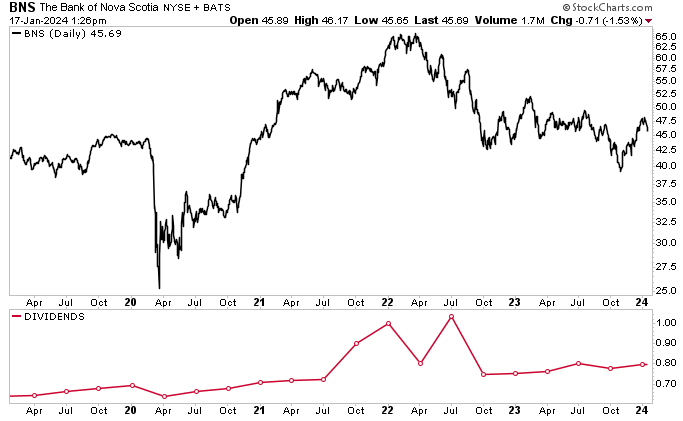6.9%-Yield Bank of Nova Scotia Stock Has Paid Dividends Since 1833

BNS Stock Poised for Income Growth & Market-Thumping Gains
Bay Street, which is Canada’s financial center, is just about an hour’s flight away from Wall Street, but the contrast between American and Canadian banks is striking.
Here are some statistics that may impress you.
Since 1967, the Canada Deposit Insurance Corporation (CDIC), an organization that provides deposit insurance to Canadians, has had to deal with only 43 situations in which depositors needed to be saved from failing financial institutions. (Source: “History of Failures,” Canada Deposit Insurance Corporation, last accessed January 22, 2024.)
Mind you, none of these instances led to an outright financial crisis in the Canadian economy.
In contrast, since late 2000, the U.S. Federal Deposit Insurance Corporation (FDIC) has had to deal with more than 560 bank failures from which depositors needed to be saved.
During the financial crisis of 2008–2009, the U.S. experienced major bank failures, bailouts, and the worst economic contraction since the 1930s. In Canada, there weren’t any major bank failures, and the economy experienced only a mild recession.
Going back further, for more than a century, the Canadian banking system has proven to be more stable than its American counterpart.
Why is that? It’s actually very simple: Canadian banks are very conservative in nature, and they’re highly regulated. That’s why you don’t often see extreme risk-taking by Canadian banks.
Great, but why should stock investors pay attention to Canadian banks? You see, Canadian banks like to keep their shareholders happy. They tend to pay hefty dividends, and they have a decent track record of raising their dividends.
With all that said, there’s one Canadian bank that income hogs should keep a close watch on: Bank of Nova Scotia (NYSE:BNS), more commonly known as Scotiabank.
About Bank of Nova Scotia
Headquartered in Toronto, Canada, Bank of Nova Scotia offers banking solutions and services in Canada, the U.S., Mexico, Peru, Chile, Colombia, the Caribbean, Central America, and elsewhere. (Source: “The Bank of Nova Scotia (BNS),” Yahoo! Finance, last accessed January 22, 2024.)
The bank operates through several business segments, namely Canadian Banking, International Banking, Global Wealth Management, and Global Banking and Markets.
Bank of Nova Scotia’s offerings include checking and savings accounts, investments, mortgages, loans, insurance, and retail automotive financing. For small, medium, and large businesses, the bank offers lending, deposits, cash management, and trade financial solutions.
Bank of Nova Scotia also offers wealth management advice and solutions. Its offerings include online brokerage, mobile investing, full-service brokerage, private banking, private investment counseling, retail mutual funds, exchange-traded funds (ETFs), liquid alternatives, and institutional funds.
Bank of Nova Scotia Stock Faces Headwinds, But Could It Be an Opportunity?
Right now, BNS stock looks like it could be more of a contrarian opportunity. I think that, a few quarters from now, investors could be saying, “I can’t believe Bank of Nova Scotia stock used to trade at such a low price.”
A little background is needed: over the past decade or so, debt in the Canadian economy has skyrocketed. The increase in debt was on the back of the red-hot housing market. Consumers and businesses took on more debt because interest rates were artificially low for a very long time.
Fast-forward to 2022–2023: as the U.S. Federal Reserve started raising interest rates to curb inflation, the Bank of Canada was doing the exact same thing. As rates increased, the housing market in Canada came to a grinding halt, prompting investors to question what would happen to the balance sheets at Canadian banks.
If Canadians can’t afford to pay their mortgages, credit card bills, and other loans, won’t banks need to write off loans?
Panic was seen in the trading of BNS stock recently. In early 2022, Bank of Nova Scotia stock traded as high as US$66.00 per share. At the time of this writing, it trades roughly 30% below that high.

Chart courtesy of StockCharts.com
Here’s the thing: Bank of Nova Scotia remains fundamentally strong, although it has certainly increased the amount of its bad debt. On a bank’s balance sheet, bad debt is reported as “provision for credit losses” (PCL). Scotiabank’s PCL is still a fraction of its overall loan book. The bank is well capitalized and is well managed overall.
For some perspective, at the end of the bank’s fiscal year 2023 (ended October 31), its PCL was CA$3.42 billion. Its total loans at the end of the fiscal year were CA$750.91 billion, and the total assets at the bank were CA$1.41 trillion. (Source: “Scotiabank Reports Fourth Quarter and 2023 Results,” Bank of Nova Scotia, November 28, 2023.)
That means Scotiabank’s PCL amounted to about 0.455% of all of its loans and 0.24% of all of its assets.
BNS Stock Has Paid Dividends Since 1833
Bank of Nova Scotia treats its shareholders really well. It has been paying dividends since 1833. That’s a track record of close to 200 years—a rare thing to find outside of Canadian banks.
Between fiscal 2013 and 2023, investors who owned Bank of Nova Scotia stock saw their dividends grow at a compound annual growth rate (CAGR) of six percent.
In November 2023, the bank declared a quarterly dividend of CA$1.06 per share, for a yield of 6.85% (as of this writing).
Despite the recent increase in Scotiabank’s PCL and pessimism about Canadian banks among investors, Bank of Nova Scotia has made it clear with its actions that dividends are an important part of returning value to its shareholders.
The Lowdown on Bank of Nova Scotia
As mentioned earlier, Bank of Nova Scotia is a major Canadian bank that’s fundamentally strong and well capitalized. It’s truly great when it comes to its very long dividend track record.
Over the past few quarters, the Canadian banking sector as a whole has faced bearish pressures, and BNS stock has gotten caught in it, too. The stock might be down, but it doesn’t look like it’s out. The long-term outlook for this Canadian bank is rosy, and Bank of Nova Scotia stock investors could generate not just solid income, but also immense capital appreciation.











